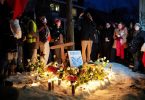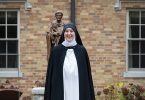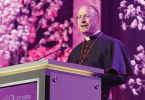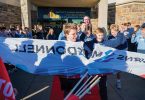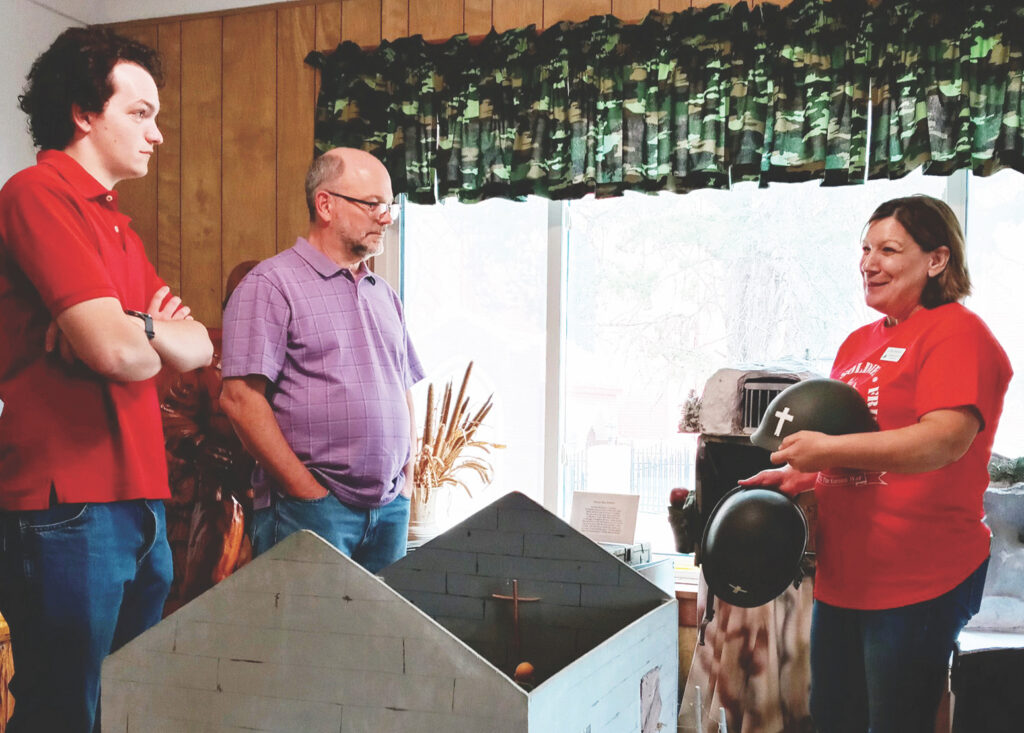
by Joe Bollig
joe.bollig@theleaven.org
LOUISBURG — There is a certain truth about men at war that Stephen Ambrose wrote about in his book “Band of Brothers.”
“They also found in combat the closest brotherhood they ever knew. They found selflessness. They found they could love the other guy in their foxhole more than themselves. They found that in war, men who loved life would give their lives for them,” wrote Ambrose about Easy Company of the 506th Parachute Infantry Regiment, 101st Airborne Division.
Servant of God Father Emil Kapaun, an Army chaplain, knew this.
So did the veterans who made a pilgrimage in October to pray at his tomb.
Eleven parishioners from Immaculate Conception Parish in Louisburg went on a pilgrimage Oct. 3 and 4 to St. John Nepomucene Church in Pilsen, and then to the Cathedral of the Immaculate Conception in Wichita.
The pilgrimage was sponsored by the Knights of Columbus.
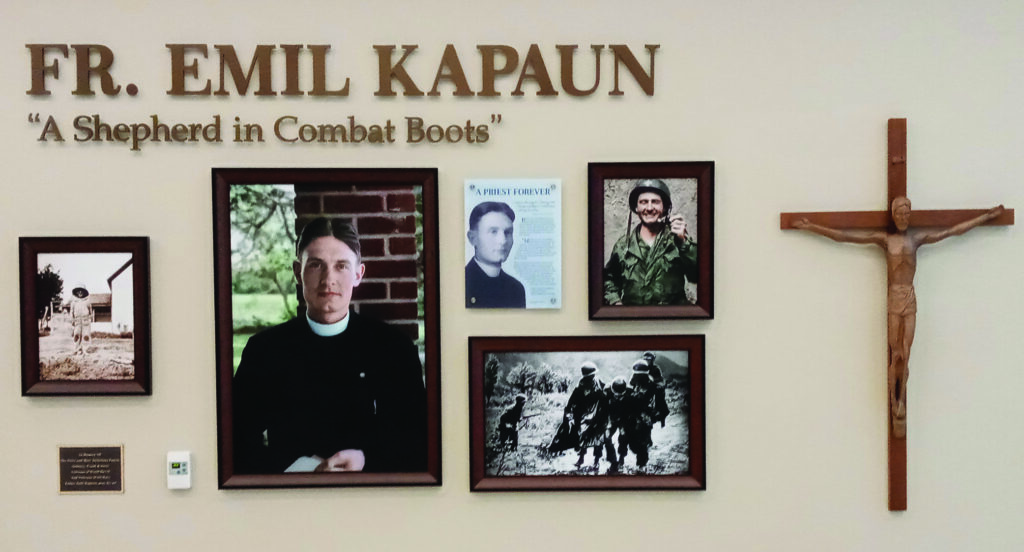
Among the pilgrims were Mike Martin, who served in the Air Force, and Ron Fields, who served in the Navy. Both are Vietnam War veterans. Martin was the main organizer of the pilgrimage, assisted by Deacon George Karnaze.
Neither veteran before the pilgrimage had a particular devotion to Father Kapaun, who may be on the road to sainthood. They knew he was a Kansan and a U.S. Army chaplain who served in World War II and in Korea, where he died.
These two things were enough to draw Martin and Fields. Father Kapaun was a brother.
Father Kapaun was born and raised on a farm a few miles southwest of Pilsen. His devoutly Catholic parents were Czech immigrants. After high school he attended the seminary and was ordained a priest on June 9, 1940.
He entered the U.S. Army in July 1944 and served in the China-Burma-India Theater. He was discharged in 1946. He rejoined the Army in 1948 and was stationed in Japan when Communist North Korea invaded South Korea in 1950. He was sent to Korea a month after the war began.
Father Kapaun, with the 8th Calvary Regiment of the 1st Cavalry Division, was in constant ministry to the living and dying. He and other GIs were captured near Unsan, North Korea, in November 1950.
His fellow prisoners of war later testified how Father Kapaun committed many acts of heroism at great risk to his life. He led the men in prayer and stole food and medicine for the sick and starving — even giving away his own food. Weakened and ill, he died in the camp’s “death house” on May 23, 1951.
His body was recovered and returned to the United States as an unknown soldier, but was later identified in 2021 and entombed in the cathedral of the Diocese of Wichita.
Father Kapaun was named a Servant of God in 1993 and awarded the Congressional Medal of Honor on April 11, 2014.
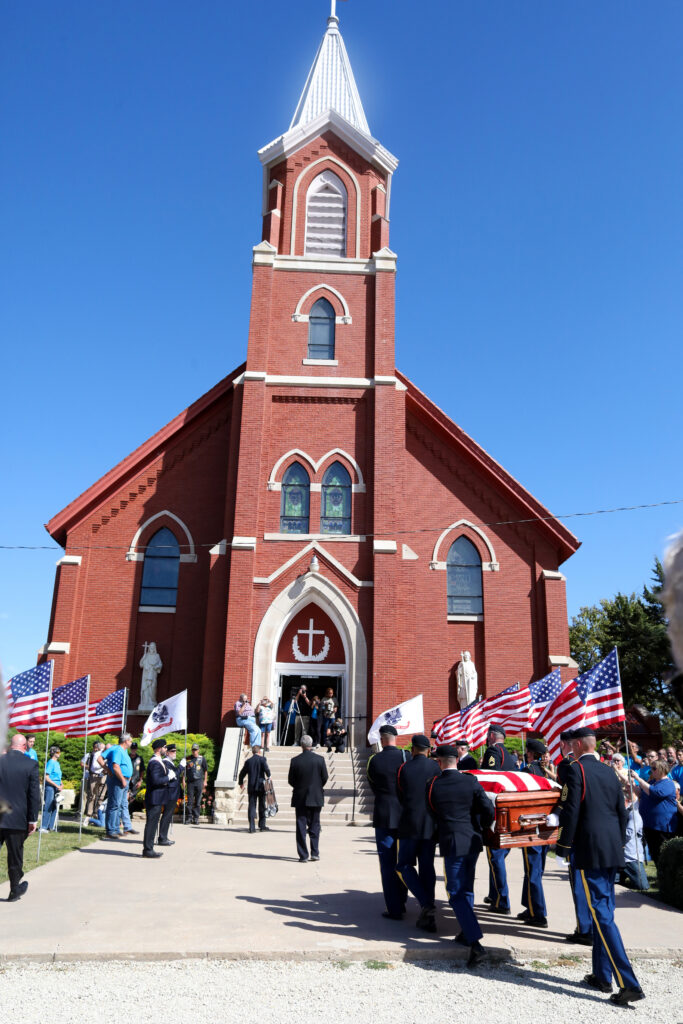
During the pilgrimage, the Louisburg parishioners visited the Pilsen church and the Father Kapaun Museum in the former rectory. The next day, they attended Mass at Immaculate Conception Cathedral, visited Father Kapaun’s tomb and had lunch before returning to Louisburg.
Both Martin and Fields knelt, placed their hands on the tomb of Father Kapaun and prayed. It was a special moment.
Martin, who graduated from Chaplain Kapaun Memorial High School (now Kapaun-Mount Carmel) in 1965, actually didn’t know too much about Father Kapaun before the pilgrimage.
“The rectory is now a museum and I learned so much about that man that I never knew,” said Martin. “The guys who served with him loved him. . . . I knew he was being considered for sainthood, and had a prayer card about it — and didn’t use it — but I wanted to learn.”
By odd coincidence, Father Kapaun’s younger brother Eugene, who died in 2010, was a janitor at Martin’s high school. Martin used to pass Kapaun in the hallways all the time, but never spoke to him. He wishes he did.
While he was at the Pilsen church, Fields thought of a quote by Navy pilot P. McCree Thornton, who said, “To those who have fought for it, freedom has a flavor that the protected will never know.”
“While I was in the church I kept thinking about that quote,” he said. “As I found out more about [Father Kapaun], how true that quote rang for him. Especially when he was being captured and went over and picked up a sergeant and kept him from being shot by a North Korean soldier.”
Fields said Father Kapaun’s life and death reminded him how military persons are so dependent on each other, and he marveled at how the priest built the camaraderie of his men, sacrificed himself and sustained his imprisoned little flock.
On the way home, Martin and Fields talked about Father Kapaun, Vietnam and the other men with whom they served. And, yes, there were some tears, too.
Both men said they now have a devotion to Father Kapaun and would return for another pilgrimage to their “brother in arms.”

